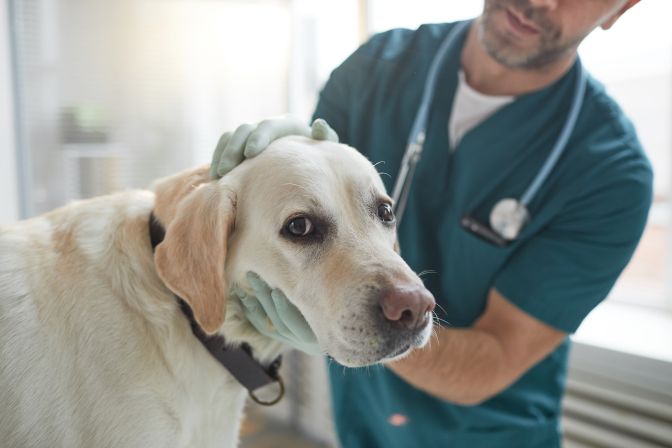Some dogs will eat anything! They are scavengers by nature, and if it looks like food then they will give it a try! Others simply enjoy chewing or playing with things that they shouldn’t, with potentially disastrous consequences. Let’s explore foreign bodies in more detail, including what will happen if your pet ingests one.
Connect with a verified veterinarian in minutes. Licensed vets are available 24/7 to answer your questions. No need to worry about your furry family member.
What is a foreign body?
A foreign body describes something that a dog has eaten but which cannot be broken down and digested. Common examples include non-food items like bits of bedding, socks, toys, or rocks. However, foreign bodies can also be things that a dog might mistake as edible, such as a whole corn-on-the-cob, the pit from an avocado, or a bone from a pork chop or chicken carcass.
Some small foreign bodies may pass through the digestive system unchanged and appear in your dog’s poop, causing little damage. However larger items or those with sharp edges are at risk of getting stuck. They may get trapped in the stomach, unable to pass through the opening into the narrower intestines. Alternatively, they could get lodged in the intestines themselves, which is known as a bowel obstruction. It is also worth noting that on rare occasions the foreign body could get stuck in the esophagus (the food pipe leading from the mouth to the stomach).
An obstruction anywhere in the digestive tract can cause serious problems.

What are the symptoms of foreign body ingestion?
The following are the most common symptoms seen if your dog has ingested a foreign body –
- Vomiting
- Diarrhea or constipation
- Abdominal pain
- Reduced appetite
- Lethargy
- Weakness
- Excessive drooling
- Collapse
If your dog is showing any of these symptoms, then make sure you call a vet immediately for an appointment. They will assess your pet further and advise you on the next steps.

Review symptoms, medications & behavior to keep your pets healthy with a Vet Online in just minutes.
Ask a Vet Live NowHow is a foreign body diagnosed?
If you have witnessed your dog eating a foreign body, then this will be fairly diagnostic and you should call your vet to tell them what has happened! However, most foreign bodies are eaten when your back is turned, and some owners don’t realize there is a problem until their dog starts showing symptoms.
If your dog is unwell, then your vet will start by examining them. They will assess their hydration status, heart rate, and temperature. They will also be looking for signs of pain and feeling for any bloating or swellings in their abdomen.
If your vet is concerned about your pet then they will then advise some tests. Blood and urine work is useful to assess your dog further for dehydration, as well as checking for any other underlying conditions that could cause similar symptoms. Blood tests for specific conditions like pancreatitis may be advised. Pancreatitis can also cause abdominal pain, vomiting, and reduced appetite, so your vet may wish to rule this out.
Diagnostic imaging is usually the next step. X-rays can show some foreign bodies very clearly, including things like bones, rocks, or metallic items. However, fabric items like toys or socks, tend not to show up very well, but your vet will also be looking at other characteristic signs of a foreign body. Suspicious areas of gas build-up could help to indicate a bowel obstruction for example.
Ultrasound is another tool that your vet can use, allowing them to examine your dog’s organs in more detail. Dilation in the digestive tract may be seen, as well as changes in the muscular movements of the intestines. This can help point toward a foreign body.
Endoscopy is another way of looking for a foreign body. Passing a long camera down into your dog’s stomach can help to look for any items that have gotten stuck there.
In some cases, however, exploratory surgery is the only way to diagnose if a foreign body is present. An exploratory laparotomy involves opening the abdomen so the vet can directly visualize the digestive tract, feeling and looking carefully along its length. They will be able to not only look for the item causing the obstruction but also assess for any associated damage to the delicate tissues of your dog’s stomach and intestines.
What is the treatment for a foreign body?
Treatment for a foreign body depends on the location of the offending item. If the object has been found in the stomach, then endoscopy may be able to retrieve it. Small forceps or a basket on the end of the camera can be used to grab some items this way (for example needles, hair bands, or small rocks).
However, in many cases of bowel obstruction surgery is required. As discussed earlier, an exploratory laparotomy is performed which allows the vet to look in the abdomen and find the location of the foreign body. The item can be removed by carefully making a hole in the intestines or stomach to get it out, and it is then closed again with dissolvable stitches.
Sometimes the surgery can be more complicated than this, particularly if there has been damage to the soft tissue of the intestine. If the blood supply in the area has been severely compromised by the foreign body or there has been tissue damage, then your vet will need to remove the affected area. If left, the tissue may die which risks a serious infection occurring and even death. Your vet might perform an end-to-end anastomosis which involves removing the affected portion of the intestines, and then carefully stitching the two healthy ends of the digestive tract back together again.
Many dogs will also require intravenous fluids to improve their hydration status, as well as pain relief, anti-nausea medications, and possibly antibiotics.
Will my dog be ok if he has eaten a foreign body?
Most dogs do well if they receive treatment promptly. Complications are more likely to arise if symptoms are ignored. Dogs can die if they are left untreated, with issues like dehydration, rupture of the digestive tract, peritonitis (infected abdomen), and death all possible outcomes
If you think your dog has eaten something that he shouldn’t have done, or if he is showing symptoms of bowel obstruction, then call your vet immediately for advice. By following their recommendations, you could save your dog’s life.
Aftercare is also important. Abdominal surgery is a big ordeal, so it is important that your dog is kept properly rested after their surgery, and that their wound is kept clean and dry. This means that they will need to wear a collar or a medical pet vest to stop them from licking at the area, which can potentially introduce infection. Follow your vet’s recommendations regarding feeding your pet too and ensure you bring him back in for his post-op check-ups.
How can I stop my dog from ingesting a foreign body?
The short answer is you can’t! Some dogs will eat anything and it can be impossible to watch them all the time! However, there are some practical steps that you can take to greatly reduce the risk.
- Check toys and bedding regularly for signs of wear and tear, removing any damaged items promptly
- Encourage your dog to play with toys appropriate for his size, avoiding dangerous items like rocks or balls that he could swallow
- Take extra care at barbeques and social events, as dogs can quickly gobble up dangerous items like kebab skewers, whole bits of corn-on-the-cob, or bones
- Keep your dog in a ‘dog-proofed’ area of the house, away from clutter, children’s toys, and clothing, if he is prone to chewing
- Muzzle your pet with a basket-style muzzle if you are taking him somewhere that you can’t trust him (muzzle training is recommended first to get your dog comfortable with wearing one while out and about)
- Consider professional behavioral training if you are struggling to control your dog’s urges to eat things he shouldn’t do
Summary
Foreign bodies can be extremely dangerous if left untreated. So, if you suspect that your dog has eaten something that he shouldn’t have then call your vet immediately. Prompt treatment leads to better outcomes when it comes to bowel obstructions. Hopefully, our practical steps will also help when it comes to preventing mishaps in the future.
FAQs
Why do dogs eat foreign bodies?
Some dogs will eat things they shouldn’t because they taste like food, for example, kebab skewers, fruit pits, bones, and packaging. Other times it happens by accident, for example, through chewing their bedding or swallowing a toy. Occasionally animals can have a condition called pica, usually due to an underlying illness, which can drive them to eat non-food items.
How long after eating a foreign body will a dog show symptoms?
It can be variable as to how soon a dog will show symptoms of foreign body ingestion. For some, the problem can become very apparent within a day or two. For other dogs, the issue may go unnoticed for several weeks or months!
How do I know if my dog has something stuck in his intestines?
Your dog will start to show signs of a stomach upset, such as vomiting, diarrhea, lethargy, and abdominal pain. If left untreated your dog may become weak, dehydrated, and could even collapse. If your pet seems unwell, or if you know they have eaten something they shouldn’t have, then call your vet immediately.
Connect with a verified veterinarian in minutes. Licensed vets are available 24/7 to answer your questions. No need to worry about your furry family member.

Rebecca MacMillan, BVetMed BSAVA PGCertSAM MRCVS
This article has been reviewed and approved by an independent Veterinarian: Rebecca is a companion animal vet who has always had a passion for writing and client communication. Since her graduation from the Royal Veterinary college in 2009 she has gained a wealth of experience in first opinion small animal practice, in both clinical and managerial roles. She currently works in the South West and deals with a variety of routine and emergency appointments, but particularly enjoys medicine cases. Outside of work and writing, she enjoys spending time with her family, including her bouncy flat coated retriever George!
Review symptoms, medications & behavior to keep your pets healthy with a Vet Online in just minutes.
Ask a Vet Live Now
